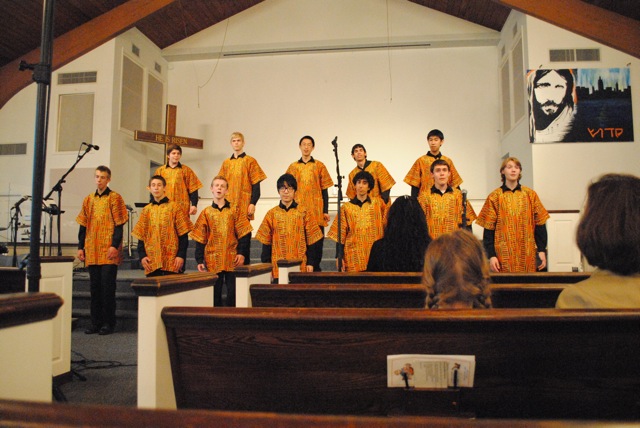NJHSA Choir Performance at Pascack Bible Church
Friday the NJSHA Choir performed at Pascack Bible Church (PBC) in Hillsdale, NJ. They recently returned from a European tour. I heard them give a Christmas performance to raise money for their trip. I remember they were good but I had forgotten how good until I heard them again Friday night.
The performance was excellent, the young men and women were exceptionally talented. To say the performance was priceless would be and understatement. They sang with superb harmony, melody, and all the other musical terms that a critic can use to rate a performance. Most of all they sang with a joy and exuberance that made me smile.
Several of the songs really stood out to me. “Paru parong Bukid” was a song about a young girl in a new dress who was having trouble paying attention in church. The emphasis put into the music made me think about the conflict in her mind as she fought to not think about the dress but to focus on the church service. It brought to mind memories and thoughts that made me smile from ear to ear. Sort of like being at the office at 4PM on beautiful friday afternoon.
“I Sing the Mighty Power of God” is a favorite song of mine and the vigor and technical skill it was sung with added power and meaing to the words. It was a marvelous opening to the line up of songs.
The YouTube videos don’t do the songs justice but they are an excellent reminder of a wonderful performance and the emotions that they stirred up by hearing them. Thanks to jgreendyk for posting them. You can find the rest of the videos of the performance as PBC (Pascack Bible Church) on this YouTube channel
Protected: Life Caught In Time
There are lives caught in time. My life progresses when the life of those who have died are stopped in time. There are no memories to be added to their life and there are only memories to forget.
Friday evening was the performance of the New Jersey Home School Association choir performance at Pascack Bible Church. It wasn’t my plan to go but for some strange reason I put it into my phone calendar the week before after it was announced. Friday arrived and I was surprised to see it on the calendar. Without any better plans, I went.
The performance was excellent, the young men and women were exceptionally talented. To say the performance was priceless would be and understatement. They sang with superb harmony, melody, and all the other musical terms that rate a performance. Most of all they sang with a joy and exuberance that made me smile.
Several of the songs really stood out to me. “Paru parong Bukid” was about a young girl in a new dress who was having trouble paying attention in church. The emphasis put into the music made me think about the conflict in her mind as she fought to not think about the dress but to focus on the church service. It brought to mind memories and thoughts that made me smile from ear to ear. The YouTube video doesn’t do the song justice but it is a good reminder of the thoughts and emotions the song stirred up.
“I Sing the Mighty Power of God” was a favorite song. It was sung with vocal skill and excellence. It was a marvelous opening to the line up of songs.
http://www.youtube.com/watch#!v=PUE4tWrEscE
What does this have to do with Steve Lauzon? As I sat looking into the smiling faces of the young people performing I remembered how skilled and bright he was. He was about the age as most of those young performers before he cut short his own life. A life that remains in my mind but will never be any longer and will only fade as memories tend to fade.
(Real) Stargate built in backyard
Hack A Day had this wonderful link filed under “misc hacks” that shows a home made stargate along with an amateur action video. Check out the page for more details.
If you happen to think this is pretty cool then check out this Stargate themed merchandise from Cafe Press.
Kinda wish my birthday was coming up soon because the geek is sexy shirt and the stargate shirt are awesome. I wonder if I can get this as a shirt instead?
Quote: To The Traveler
may your travel be smoothmay your guide be kindmay you arrive on timewith the Lord shall you dine.-RIC S. BASTASA
“I Will Believe It A Good Comfortable Road”
Over 10 years ago during vacation bible school a friend shared this passage with the students she was teaching. The passage was from a book about the travels of Lewis and Clark.
May 26, 1805 – The camp was in Fergus County, Montana, two miles below the mouth of Windsor Creek. The men used the tow lines to pull the boats up the river. Lewis saw the Rocky Mountains for the first time and left a lengthy description of the countryside: “In the after part of the day I also walked out and ascended the river hills which I found sufficiently fortiegueing. on arriving to the summit one of the highest points in the neighbourhood I thought myself well repaid for any labour; as from this point I beheld the Rocky Mountains for the first time these points of the Rocky Mountains were covered with snow and the sun shone on it in such manner as to give me the most plain and satisfactory view. while I viewed these mountains I felt a secret plaesure in finding myself so near the head of the heretofore conceived boundless Missouri; but when I reflected on the difficulties which this snowy barrier would most probably throw in my way to the Pacific, and the sufferings and hardships of myself and party in them, it in some measure counterbalanced the joy I felt in the 1st moments in which I gazed on them; but as I have always held it a crime to anticipate evils I will believe it a good comfortable road untill I am compelled to believe differently.” -Meriwether Lewis
Adapted from the NPS.gov Lewis and Clark timeline. Emphasis added.
The quote may have been misplaced in my mind for almost 10 years but recent events in my life knocked it lose from the back of my mind and brought it to my memory. There may be 200 years between Mr. Lewis and myself but the words so succinctly describe my feelings on the adventure that was awaiting me.


